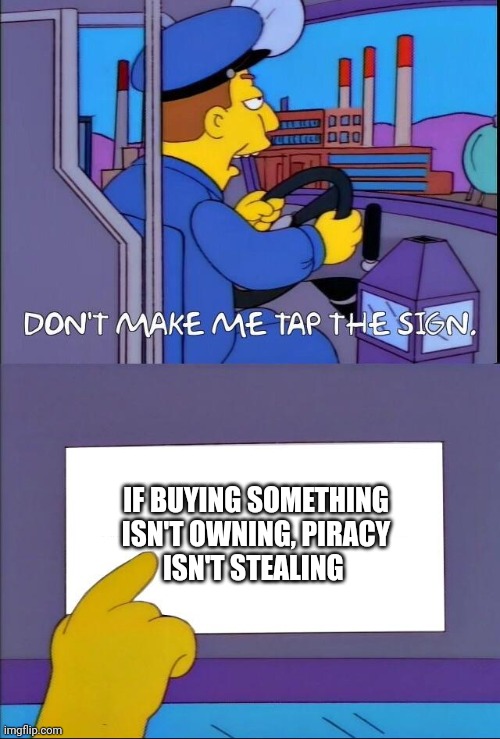this post was submitted on 02 Feb 2024
1285 points (96.1% liked)
memes
16011 readers
2484 users here now
Community rules
1. Be civil
No trolling, bigotry or other insulting / annoying behaviour
2. No politics
This is non-politics community. For political memes please go to !politicalmemes@lemmy.world
3. No recent reposts
Check for reposts when posting a meme, you can only repost after 1 month
4. No bots
No bots without the express approval of the mods or the admins
5. No Spam/Ads
No advertisements or spam. This is an instance rule and the only way to live.
A collection of some classic Lemmy memes for your enjoyment
Sister communities
- !tenforward@lemmy.world : Star Trek memes, chat and shitposts
- !lemmyshitpost@lemmy.world : Lemmy Shitposts, anything and everything goes.
- !linuxmemes@lemmy.world : Linux themed memes
- !comicstrips@lemmy.world : for those who love comic stories.
founded 2 years ago
MODERATORS
you are viewing a single comment's thread
view the rest of the comments
view the rest of the comments

Piracy technically isn't stealing, it's intellectual property reproduction license violation. Clever bastards those lawyers. You basically don't purchase the music, you purchase the right to reproduce it for non-commercial purposes.
Exactly. If I stole an item that belongs to you, I'm denying you the possession of that item, and you'll either have to acquire another one, steal it back, or just not have it at all. When someone commits an act of digital piracy, they aren't denying anyone the possession of it, therefore it isn't the same as stealing.
Calling it theft is, in my opinion, emotionally manipulative and prevents any serious discussion on the ethics of piracy.
Even the word piracy is a bit suspicious to me; original pirates robbed ships in international waters and were considered enemies of mankind, so calling a much lesser act piracy sounds very manipulative... I wonder where the word piracy was first used to describe copyright violations, can't seem to find anything about it.
Piracy was used as far back as the 1700s to refer to illegal copies of books or unauthorized publishing outside of publishing monopolies. In general, I get the feel of breaking monopolies, turning to less savory methods to get what is owed, and liberating goods from the hands of wealthy hoarders.
For a while, the U.S. publishing industry was based on pirating British books, many of which were previously pirated from France. The only significant difference between the usages is the freeing of information vs keeping goods for oneself.
That's interesting and informative, thank you.